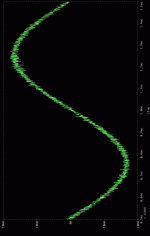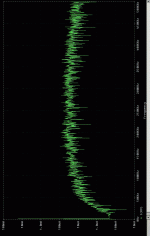Visionaries: Audio & speaker tech in 10 years??
What will be the greatest changes in audio in 10 years?
What will speaker technology look like in 10 years?
Top 3-5 predictions??
1) DVD will win. Multi-channel DVD audio will dominate audio, and finally work well.
2) Rare Earth NdFeB magnets will become cheap and common. Patents for differential drive motors will elapse, and wide bandwidth long throw woofers and midranges will either be differential drive or underhung.
3) Long throw underhung 7"- 8" midranges and low 500 Hz Fs tweeters with 1.5mm Xmax will allow full range 2-way designs for HT. Digital amps, crossovers and equalization will tie the system together.
4) Most multi-channel audio will be all digital with room equalization up to the speakers.
5) Efficient digital amps with these hi-Xmax, wide bandwidth speakers will allow small equalized sealed boxes good to 20Hz.
my world) Hi-Xmax 8" speakers, plus new ribbons and planars will allow attractive narrow baffle Linesources.
Looking back 10 years, DVD movies and multi-channel audio seems the largest change. Small changes in motor design and materials have yielded large changes in sonics.
My main system changed to a 5:0 configuration, constructed more for DVD movies than multi-channel audio. The availability of low cost NdFeB rare earth magnets has created the biggest change in my speakers. 98 db/watt, 20-30Khz linesources allow small, sweet sounding Class-A amps and active crossover stages. Moving the DAC to the speakers would be the next evolution. Experiments with digital amps show filter artifacts.
What will be the greatest changes in audio in 10 years?
What will speaker technology look like in 10 years?
Top 3-5 predictions??
1) DVD will win. Multi-channel DVD audio will dominate audio, and finally work well.
2) Rare Earth NdFeB magnets will become cheap and common. Patents for differential drive motors will elapse, and wide bandwidth long throw woofers and midranges will either be differential drive or underhung.
3) Long throw underhung 7"- 8" midranges and low 500 Hz Fs tweeters with 1.5mm Xmax will allow full range 2-way designs for HT. Digital amps, crossovers and equalization will tie the system together.
4) Most multi-channel audio will be all digital with room equalization up to the speakers.
5) Efficient digital amps with these hi-Xmax, wide bandwidth speakers will allow small equalized sealed boxes good to 20Hz.
my world) Hi-Xmax 8" speakers, plus new ribbons and planars will allow attractive narrow baffle Linesources.
Looking back 10 years, DVD movies and multi-channel audio seems the largest change. Small changes in motor design and materials have yielded large changes in sonics.
My main system changed to a 5:0 configuration, constructed more for DVD movies than multi-channel audio. The availability of low cost NdFeB rare earth magnets has created the biggest change in my speakers. 98 db/watt, 20-30Khz linesources allow small, sweet sounding Class-A amps and active crossover stages. Moving the DAC to the speakers would be the next evolution. Experiments with digital amps show filter artifacts.
What? How can you get more digital than one that has microprocessor controlled switching MOSFETs? Mmmmmm!: Hybrid PFM + PWM with a switching frequency up to 5MHz or more and switching precision over 100MHz... precision feedback for rail and load variations... switchmode power supplies, signal-dependent rail voltage regulation... multiple channels with digital crossover filters, speaker compensation and room compensation... Yum!Nappylady said:....I've been thinking about a way to create a truly digital amplifier, and AFAICT, it hasn't been done yet... I'm interested in hearing about this thing you're talking about.

 If it hasn't been done, it sure can be!
If it hasn't been done, it sure can be!Speakers:
How about state/king intervention? Prohibiting all paper/pulp coned speakers would be a good start!
Recording technology:
I'm sick of reading how nothing beats analogue magnetic tape for recording high-quality sound. I'm looking forward to some quality application of today's ADC technology - it's time to let go of those myths about the superiority of old analogue recording techniques. This should happen - not in 10 years, but today!
CM
I've been thinking about a way to create a truly digital amplifier, and AFAICT, it hasn't been done yet... I'm interested in hearing about this thing you're talking about.
If one is strict then there is no such thing as a digital amplifier, it is simply a marketing term. Amplification per se is always an analog operation.
If you are less strict you can call power DACs using digitally generated PWM or delta-sigma modulation digital amplifiers.
But any type of switching amp will help to reduce size and cost and thereby boosting multichannel and active solutions.
Even with today's switching amplifier technologies 80 % of the linear amps currently in use could be substituted IMO.
Regards
Charles
Well, ten years ago Audio magazine carried an interview with a prominent audio engineer who said that in ten years, he figured the cone loudspeaker would disappear from any real hi fi setup.
Here we are ten years later, and not only is the cone loudspeaker alive and well, but the previous posters predicted only a few changes to it's magnetic system and cone material. In other words, they are predicting it will be around in recognizable form for at least another ten years.
And ten years ago people were predicting it's demise entirely for all but the cheapest applications.
Here we are ten years later, and not only is the cone loudspeaker alive and well, but the previous posters predicted only a few changes to it's magnetic system and cone material. In other words, they are predicting it will be around in recognizable form for at least another ten years.
And ten years ago people were predicting it's demise entirely for all but the cheapest applications.
Cones and domes will still win out by sheer numbers, but I predict a true digital speaker will emerge between now and then, using novel signal and transduction methods. I've had a concept kicking around in my mind for a while- all I need is a few hundred thousand dollars to make it work!
The demise of the cone loudspeaker... what an interesting idea. What on earth posessed them to predict such a thing? Did they think ribbons were suddenly going to catch on like wildfire?
I think about class D amplifiers and their switching speeds of maybe a couple Mhz... then I think about FM radio, and its switching speed of 89-108 Mhz, and how it doesn't have really good treble response...
Somehow, I think the whole idea of class D amplifier just sucks!
I think about class D amplifiers and their switching speeds of maybe a couple Mhz... then I think about FM radio, and its switching speed of 89-108 Mhz, and how it doesn't have really good treble response...
Somehow, I think the whole idea of class D amplifier just sucks!
Equipment and loudspeakers will more and more begin to look like fashionable design-items, you know, non-functional shapes and colors that really sell.
If enough thinking is done is is also possible to make optically stunning designs that are still belonging to the category "form follows function".
One classic item: The "original" B&W Nautilus
Another one:
http://www.celticaudio.co.uk/cabar.htm
Regards
Charles
LineSource said:The availability of low cost NdFeB rare earth magnets has created the biggest change in my speakers. 98 db/watt, 20-30Khz linesources allow small, sweet sounding Class-A amps and active crossover stages. Moving the DAC to the speakers would be the next evolution. Experiments with digital amps show filter artifacts.
which speakers do you use? I have not found NdFeB or SmCo often in the DIY space.
FM radio is completely different. That's why they gave it a different name: frequency modulation. Some of its limitations are due to controls on broadcasting bandwidth and signal amplitude, to fit lots of stations in adjacent frequency bands.Nappylady said:...I think about class D amplifiers and their switching speeds of maybe a couple Mhz... then I think about FM radio, and its switching speed of 89-108 Mhz, and how it doesn't have really good treble response...
Somehow, I think the whole idea of class D amplifier just sucks!
But you're right, at high frequencies class D amps can't be expected to deliver top quality sound. Be they linear or with discrete steps like DSD, they lose accuracy with increasing audio frequencies. I say do this: class-A or AB at high frequencies, and operate class-D amps in the low midrange and bass.
CM
Why do you say they loose accuracy? Basically they are no different in this respect than DACs.
You have given the answer yourself: They are no different than DACs and thats why they loose accuracy towards higher frequencies.
Below you will find the output of a hypothetical SD amplifier 20 dB below clipping.
The 2nd one shows the FFT of the output signal containing the shaped noise.
Regards
Charles
Attachments
Yes Charles, sure, I get your point, (this may move off topic) but is that a reason to use SD only for low requencies? Analog amps also decrease in accuracy at higher freqs, and worse than SD. Just look at the customary increasing distortion and noise with frequency. Just as we do with DACs, with SD there is a lot of mileage in better filtering, less jitter and increased sampling frequency. Ultimately, no magic amp can undo the damage from the source digitization, so if your SD is at least as good as the DAC, there doesn't appear any point in trying to improve it.
Jan Didden
Jan Didden
....but is that a reason to use SD only for low requencies?
No, not of course. As you can see (barely, I have to admit), the noise and harmonics below 10 kHz are at least 96 dB below the "payload" at 1 kHz. At 20 kHz the difference is still about 80 dB. If one can build a switching amp of that quality in practice he must bring quite some skills I assume.
Regards
Charles
there will still be tube amps. And there still will be some Alniko magnet speakers at 10 times the costs of a consumer disk player each.
Noone will ever doubt that.
Regards
Charles
- Status
- This old topic is closed. If you want to reopen this topic, contact a moderator using the "Report Post" button.
- Home
- Loudspeakers
- Multi-Way
- Visionaries: Audio & speaker tech in 10 years??

